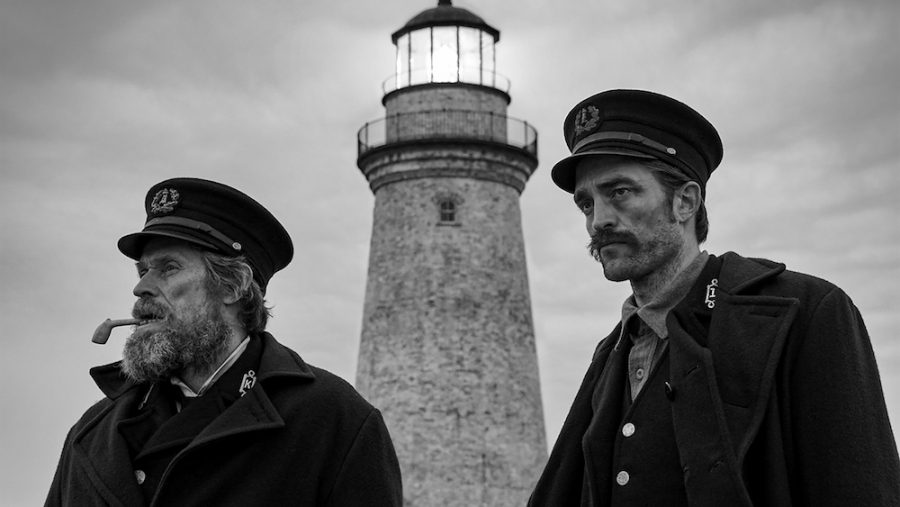“The Lighthouse” delivers tense, unsettling Experience
Photo property of A24. Fair Use.
Dafoe and Pattinson star as a pair of secluded lighthouse-keepers.
It’s not often that a black-and-white film with an aspect ratio of 1.19:1, camera lenses dating back to the 30’s, and custom-built sets gains enough marketability to grace the silver screen, but when it does, it doesn’t hold back.
“The Lighthouse” director Robert Eggers chiefly accomplishes his goal of allowing viewers to marinate in an atmospherically compelling tale through powerhouse acting, centered around the ex-timberman Ephraim Winslow (Robert Pattinson) and the old salt Thomas Wake (Willem Dafoe).
The two immediately recognizable cinematic icons, Dafoe and Pattinson, both pull their weight through the entire hour-and-fifty-minute-runtime, delivering on multiple emotionally-charged soliloquies. They make an impact with facial expressions that convey more than words ever could. They revel in physically violent moments that show just how terrifying an old seaman and his younger apprentice can be.
The main conflict of “The Lighthouse” revolves around the contents of the light room, which houses the lighthouse’s light, and just why Winslow isn’t allowed within. Wake orders Winslow not to try entering the uppermost level of the structure, claiming it belongs to him and him alone. As the film progresses, Winslow becomes more and more obsessed with entering the top room.
There are countless takes one can have on “The Lighthouse,” and that’s an endearing quality I’m happy to see return to horror cinema. Films like “Midsommar,” “Hereditary,” and “The VVitch,” (all A24 productions) are genre-bending and innovative, not like the constant stream of low-in-quality-high-in-jumpscares drivel that has become commonplace (“Annabelle Comes Home,” “Crawl,” “The Nun.”)
The simplest reading of “The Lighthouse” is the straightforward one: a seafaring tale of two mentally unstable men slowly losing their fragile grip on sanity. Any mermaids, squid-men or other supernatural elements can be written off as hallucinations.
Another way is to see “The Lighthouse” as a modern retelling of Greek mythology, namely tales of Proteus and Prometheus, being embodied in Wake and Winslow respectively. Proteus was the son of Poseidon and god of the sea, commonly seen as a half-man, half-squid being.
Still another way is to see the film as an allegory for the Garden of Eden, with the light within the lighthouse being representative of the tree of the knowledge of good and evil. Adam and Eve are forbidden access, similarly to Winslow, and are brutally punished when they betray God and take the fruit.
The most glorious part is that all these interpretations are correct. They all are valid, as is whatever reading you cook up when you see it (and you really should). Robert Eggers intentionally structured the film so that audiences could get any number of interpretations from it, and that’s where the cinematic beauty lies.




